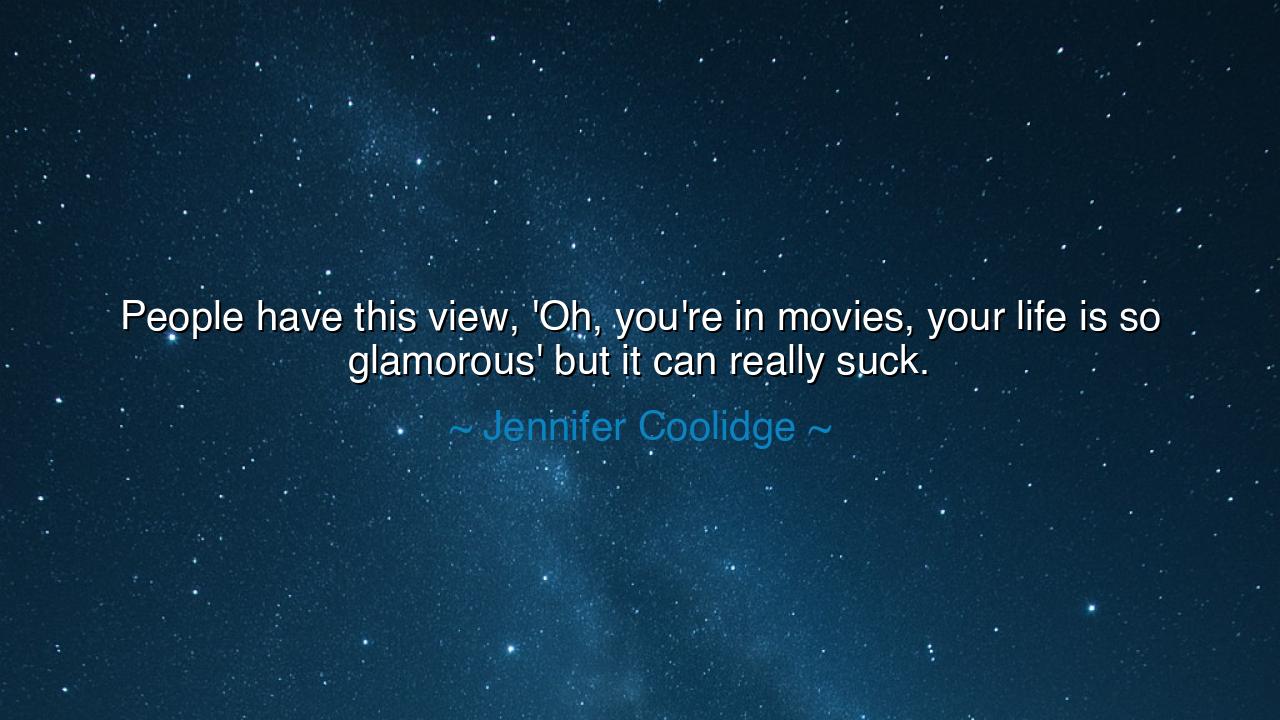
People have this view, 'Oh, you're in movies, your life is so
People have this view, 'Oh, you're in movies, your life is so glamorous' but it can really suck.






When Jennifer Coolidge declared, “People have this view, ‘Oh, you’re in movies, your life is so glamorous’ but it can really suck,” she tore away the gilded veil that so often blinds the eyes of the multitude. Her words are not a lament of ingratitude but a testimony to truth—that the image of splendor and ease is often but a shadow, while behind it lies toil, loneliness, and wounds unseen. To those who worship fame from afar, she offers a warning: do not mistake the mask for the face, nor the glitter of stage lights for the warmth of real joy.
The glamour of cinema is an illusion crafted as carefully as the films themselves. The red carpets, the flashing cameras, the fine garments—all are but fleeting ornaments, displayed for a moment and then gone. Yet beneath them lies the endless labor of auditions, the harshness of rejection, the burden of constant scrutiny, and the gnawing fear that one’s worth is measured only by public approval. What the crowd beholds as glory, the one who lives it may feel as chains. Thus Coolidge speaks with honesty, shattering the myth that fame is equal to happiness.
This paradox is not new. Recall the story of Emperor Nero, who adorned himself in splendor and demanded the adoration of the masses. To the people, his life seemed filled with music, performance, and glory. Yet ancient historians tell us his soul was restless, tormented, and consumed by fear of betrayal. The stage upon which he shone was also the prison in which he suffered. In Coolidge’s words, we see the echo of this ancient truth: the life that appears glamorous to others may, in its hidden reality, “really suck.”
Coolidge also reminds us of the loneliness that fame can bring. For when people see only the glittering mask, they cease to see the human beneath it. The actor is adored, yet not always known. Surrounded by thousands, yet understood by few, many artists find themselves isolated even in the midst of applause. In this way, her words are not only a confession but a plea for understanding—that we look upon those in the spotlight not as idols, but as men and women with hearts as fragile as our own.
The lesson, O seekers of wisdom, is this: do not envy blindly. Do not believe that those adorned with wealth or fame are freer or happier than you. Instead, cultivate gratitude for the quieter blessings of your own life: the love of true friends, the peace of a private moment, the dignity of honest labor. For these, though less dazzling, are often more enduring than the applause of strangers.
Practical action lies before you. When you see another whose life appears splendid, remind yourself that you do not know the burdens they carry. Do not build your happiness upon comparison, nor chase after illusions. Instead, build your joy upon what is real—relationships of depth, work of meaning, and self-respect untethered to the fickle winds of public praise. Let the glamour of others inspire admiration if you wish, but never let it poison your contentment.
Therefore, let Coolidge’s words remain as a warning and a comfort: the world will always paint fame as golden, but those who live within it know its tarnish. Seek not the hollow shine of glamour, but the enduring light of authenticity. For in truth, a humble life lived with honesty, love, and self-knowledge may prove far richer than the most dazzling life upon the stage. And that is the wisdom she gifts us: that what looks like everything, may, in the heart’s quiet truth, be less than nothing.






AAdministratorAdministrator
Welcome, honored guests. Please leave a comment, we will respond soon